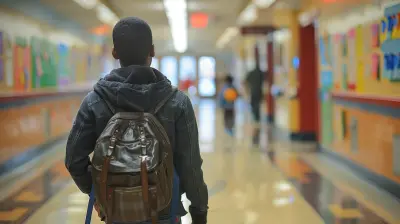How to Train Students to Give Constructive Peer Critiques
19 December 2024
Feedback is crucial to growth, right? Whether you're learning how to cook, play an instrument, or improve in academics, having someone give you pointers can make all the difference. But here's the catch: not all feedback is helpful! Some are too vague, others too harsh, and some might even be just a pat on the back with no direction at all. This is where constructive peer critiques come into play.
In the academic world, peer critiques can be a game-changer. They allow students to learn from one another, improve their work, and foster a community of collaboration. However, giving effective feedback is a skill in itself—one that needs to be taught and practiced. In this article, we'll dive deep into how to train students to give constructive peer critiques, ensuring that the feedback they provide is meaningful, actionable, and, most importantly, constructive.

Why Peer Critiques Matter
Before you can teach students how to give constructive critiques, it's essential for them to understand the "why" behind it. Why should they care? Why does it matter?Boosts Critical Thinking
When students critique each other’s work, they aren't just passively absorbing information. They're actively engaged in critical thinking, analyzing strengths and weaknesses. This process sharpens their ability to evaluate not only others' work but also their own.Builds Communication Skills
Learning how to give and receive feedback is a life skill. Whether in the workplace or in relationships, the ability to communicate effectively, especially when discussing sensitive topics (like someone's work), is invaluable.Reinforces Learning
Teaching is one of the best ways to learn. By critiquing a peer’s work, students revisit the material, think about it from different angles, and reinforce their own understanding.Encourages Collaboration
Peer critiques foster a sense of community. Instead of seeing classmates as competition, students can support each other’s growth. It builds an atmosphere of trust and mutual respect, where everyone is working toward improvement.
Essential Components of Constructive Peer Critiques
Now that we know why peer critiques are important, how do we make sure they’re constructive? Not all feedback is created equal. A simple “good job” or “I didn’t like it” doesn’t help anyone. Let’s break down the essential components of a constructive critique.1. Be Specific
Vague feedback is the enemy. If a student says, "I liked your paper," that's great, but it doesn't provide much value. Instead, they should focus on specific aspects: "I liked how you introduced your argument in the second paragraph. It was clear and concise."Tip: Encourage students to cite specific examples from the work they’re critiquing. It shows they’ve engaged deeply with the material and provides the writer with concrete areas to focus on.
2. Balanced Feedback (The Sandwich Method)
No one wants to hear only negative feedback, and at the same time, all praise without any suggestions for improvement doesn’t help either. The Sandwich Method is a popular strategy for framing feedback. Start with something positive, then offer constructive criticism, and end with another positive note.For example:
- "Your thesis statement is strong and really clear. However, I think the transition between paragraphs 2 and 3 could be smoother. But overall, your conclusion ties everything together nicely."
3. Focus on the Work, Not the Person
This is a big one. Feedback should always be about the work, not the individual. Instead of saying, "You're not good at writing introductions," students should frame it as, "The introduction could be more attention-grabbing by starting with a question or an interesting fact."This ensures that the feedback feels less personal and more about improving the piece of work.
4. Offer Solutions, Not Just Problems
Pointing out what didn’t work is important, but offering potential solutions is even better. If a student says, "Your argument isn't very convincing," they should also suggest ways to improve: "Maybe you could include more evidence or a stronger example to back up your point."5. Be Respectful and Empathetic
It’s easy to fall into the trap of being overly critical. Remind students that they should always approach peer critiques with empathy. How would they feel if they received the same feedback? Critiques should be respectful and framed in a way that encourages growth, not discouragement.
Steps to Train Students for Constructive Peer Critiques
Okay, now that we’ve covered the essentials, let's get into the nitty-gritty: How do you actually train students to give constructive peer critiques? Here's a step-by-step guide that will help you get started.1. Set Clear Expectations
Before diving into peer critiques, make sure students understand what is expected of them. Explain the purpose of the critiques and why it’s important to be constructive. Share examples of both good and bad feedback to highlight what you’re looking for.2. Provide a Framework or Rubric
Students often struggle with where to start. Providing them with a rubric or framework helps guide their feedback in the right direction. You could create a checklist they should follow, such as:- Did the introduction grab your attention?
- Is the argument clear and well-supported?
- Are there any confusing sections?
- What did you like most about the work?
- What is one area that could be improved?
3. Model the Process
Before asking students to critique each other’s work, model the process. Take a sample piece and walk through how you would critique it, using the framework or rubric you provided. This gives students a concrete example to follow.4. Start Small with Low-Stakes Assignments
When students are just learning how to give critiques, start with low-stakes assignments. For example, have them practice on short paragraphs or outlines rather than full essays. This takes the pressure off and allows them to focus on the process of giving feedback.5. Incorporate Peer Critiques into Regular Assignments
Once students are comfortable with the process, make peer critiques a regular part of your assignments. This could be a formal part of their grade or an informal exercise before they turn in their final drafts.Pro Tip: Set aside time in class for peer critiques so students don’t feel rushed to complete them at home. This also allows you to monitor the process and provide guidance as needed.
6. Encourage Reflection and Self-Assessments
After the peer critique session, ask students to reflect on the feedback they received. What was helpful? What wasn’t? This encourages students to think critically about the feedback and how they can apply it to their work.You can also have them complete self-assessments before receiving peer critiques. This helps them develop a deeper understanding of their own strengths and weaknesses.
7. Practice, Practice, Practice
Like any skill, giving constructive feedback takes practice. Incorporate peer critiques into your class regularly, and encourage students to continue refining their ability to give and receive feedback.
Challenges and How to Overcome Them
Of course, no strategy is without its challenges, and peer critiques are no exception. Here are a few common obstacles you might face, along with some tips for overcoming them.1. Reluctance to Critique Peers
Some students may feel uncomfortable critiquing their peers, especially if they’re friends. To overcome this, emphasize the importance of constructive feedback and how it helps everyone improve. You could also consider anonymous peer critiques to remove some of the social pressure.2. Overly Harsh or Vague Feedback
As we mentioned earlier, feedback can sometimes be too vague or too harsh. This is where modeling and providing clear rubrics come in handy. The more structure you provide, the less likely students are to give unhelpful feedback.3. Time Constraints
Incorporating peer critiques can eat into class time, especially if students are working on longer assignments. To address this, you can limit critiques to specific sections of an assignment or focus on one or two key areas for improvement.Conclusion
Teaching students to give constructive peer critiques is an invaluable skill that goes beyond the classroom. It encourages critical thinking, fosters collaboration, and helps students become better communicators. With a little guidance, practice, and the right framework, you can create a classroom environment where feedback is not only welcomed but also embraced as an essential part of the learning process.So, next time your students are working on an assignment, don’t hesitate to incorporate peer critiques. It may take some time to get into the groove, but once they do, the benefits will speak for themselves. After all, we all grow better together, right?
all images in this post were generated using AI tools
Category:
Peer FeedbackAuthor:

Madeleine Newton
Discussion
rate this article
18 comments
Lacey Becker
Great article! Teaching students to provide constructive peer critiques is essential for their growth. Focus on clear guidelines and encourage a positive mindset. This not only improves their feedback skills but also fosters a collaborative learning environment. Well done!
March 9, 2025 at 11:29 AM

Madeleine Newton
Thank you for your thoughtful feedback! I completely agree that clear guidelines and a positive mindset are key to fostering a collaborative environment. I appreciate your support!
Leslie Vasquez
Thank you for this insightful article! The strategies you've outlined for training students in constructive peer critiques are incredibly valuable. Fostering a supportive environment for feedback not only enhances learning but also builds essential skills for collaboration. I look forward to implementing these techniques in my classroom!
February 1, 2025 at 7:22 PM

Madeleine Newton
Thank you for your kind words! I'm glad you found the strategies valuable and wish you the best in implementing them in your classroom!
Indie Wyatt
Empower honesty; growth thrives on feedback!
January 29, 2025 at 5:40 AM

Madeleine Newton
Absolutely! Encouraging honesty in feedback fosters a growth mindset and enhances learning. Thank you for your insight!
Courtney Phelps
Empowering students to give constructive peer critiques fosters collaboration and growth. By nurturing their ability to provide feedback, we equip them with essential skills for success in and out of the classroom!
January 24, 2025 at 8:52 PM

Madeleine Newton
Absolutely! Empowering students to provide constructive feedback not only enhances collaboration but also builds essential life skills that benefit them beyond the classroom.
Ruby Kline
Unlock the hidden potential of student critiques; what if their insights could reshape not only their peers but the curriculum itself?
January 18, 2025 at 1:44 PM

Madeleine Newton
Absolutely! Harnessing student critiques can lead to invaluable insights that benefit peers and enhance the curriculum, fostering a more collaborative and responsive learning environment.
Grace McRae
Empowering students to deliver constructive critiques cultivates a culture of growth and empathy. It transforms feedback from mere evaluation into a collaborative journey, fostering resilience and deeper understanding in learning.
January 12, 2025 at 8:14 PM

Madeleine Newton
Thank you for your insightful comment! I completely agree that fostering a culture of constructive critique not only enhances learning but also builds empathy and resilience among students.
Faenor Clarke
Empowering students to provide constructive peer critiques fosters a culture of growth and collaboration. By teaching effective communication and active listening, we equip them with essential skills for constructive feedback, encouraging a supportive learning environment where all voices contribute to collective improvement.
January 5, 2025 at 11:51 AM

Madeleine Newton
Thank you for highlighting the importance of empowering students in the feedback process. Fostering effective communication and active listening not only enhances their critique skills but also cultivates a collaborative and supportive learning environment.
Hayes
Great article! Training students to give constructive peer critiques is essential for fostering a positive learning environment. Encouraging open communication and emphasizing the importance of feedback can truly enhance their critical thinking skills. Love the practical tips you’ve shared—can’t wait to implement them in my classroom! Keep up the great work!
December 31, 2024 at 3:42 AM

Madeleine Newton
Thank you for your kind words! I'm glad you found the tips helpful and can’t wait to hear how they work in your classroom!
Gideon McNeil
Empowering constructive critiques fosters collaboration and deeper learning.
December 27, 2024 at 7:17 PM

Madeleine Newton
Absolutely! Encouraging constructive critiques not only builds collaboration but also enhances critical thinking and learning among students.
Patrick Ruiz
Great insights! Teaching students to give constructive critiques not only enhances their communication skills but also fosters a supportive classroom atmosphere. Remember, every piece of feedback is a step towards growth—let the learning begin!
December 24, 2024 at 1:20 PM

Madeleine Newton
Thank you! I completely agree—fostering constructive critiques is essential for both student growth and a collaborative learning environment. Let’s empower our students to thrive!
Courtney Gonzalez
Great insights! Training students in constructive critiques fosters a supportive learning environment and boosts collaboration!
December 22, 2024 at 3:44 AM

Madeleine Newton
Thank you! I completely agree—constructive critiques are essential for building collaboration and support in the classroom.
Callie Bryant
Great insights on fostering constructive peer critiques! Essential skills for students' growth and collaboration. Looking forward to implementing these strategies!
December 21, 2024 at 7:21 PM

Madeleine Newton
Thank you! I'm glad you found the insights valuable. Best of luck with implementing the strategies!
Mason Taylor
Empower feedback through structure.
December 21, 2024 at 3:52 AM

Madeleine Newton
Absolutely! Providing a clear framework for feedback helps students focus on specific aspects, making their critiques more constructive and actionable.
Heidi Yates
Training students to give constructive peer critiques is like teaching them to wield a scalpel instead of a sledgehammer—precision and empathy matter. Equip them with the right tools, and they'll transform feedback from a weapon into a pathway for growth.
December 20, 2024 at 9:28 PM

Madeleine Newton
I completely agree! By fostering precision and empathy in peer critiques, we empower students to offer insightful feedback that truly supports growth. Well said!
Quill Smith
Great tips! Encouraging students to give constructive peer critiques not only improves their critical thinking skills but also fosters a supportive classroom environment. Clear guidelines and practice are key to success.
December 20, 2024 at 5:35 AM

Madeleine Newton
Thank you! I completely agree—constructive peer critiques enhance critical thinking and strengthen classroom community. Clear guidelines are essential for effective practice.
Tristan Spencer
Great insights! Teaching students to give constructive critiques is like turning them into friendly coaching ninjas! Encourage them to sprinkle their feedback with kindness and creativity. With practice, they'll be wielding their pens (or keyboards) like pro critics, nurturing a supportive classroom vibe. Let the peer critique adventure begin! 🥷✍️
December 19, 2024 at 9:05 PM

Madeleine Newton
Thank you! I love the idea of turning students into "coaching ninjas." Encouraging kindness and creativity will definitely enhance the peer critique experience! 🥷✨
Thistle Patterson
Great insights! Teaching students to give constructive critiques not only boosts their communication skills but also fosters a supportive classroom environment. It's all about building confidence and collaboration. Love this approach!
December 19, 2024 at 11:15 AM

Madeleine Newton
Thank you for your thoughtful comment! I completely agree that fostering constructive critiques enhances communication and collaboration among students.
Evangeline Bailey
Because feedback can’t be overrated!
December 19, 2024 at 5:46 AM

Madeleine Newton
Absolutely! Constructive feedback is essential for growth and development in any learning process.
MORE POSTS

Socratic Seminars: Promoting Deep Discussions in the Classroom

Addressing Inequities in School Funding for Rural Communities

How Music Can Accelerate Your Language Learning

Why Self-Care is Crucial for Academic Success

The Science Behind Critical Thinking: What Research Tells Us

Community Engagement and School Funding: Why Parent Voices Matter

The Connection Between Media Literacy and Democracy

Turning Failure into a Learning Opportunity

How School Funding Impacts College Readiness Programs

The Link Between School Funding and Teacher Quality

Media Literacy for Social Justice: Challenging Stereotypes and Bias